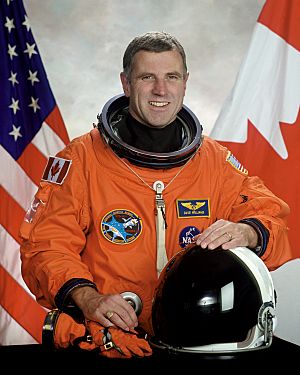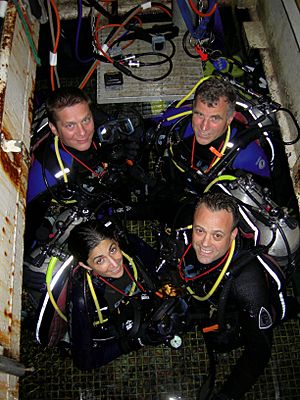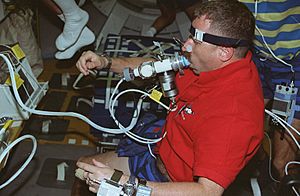Dafydd Williams facts for kids
Quick facts for kids
Dafydd Williams
|
|
|---|---|

Official portrait, 2006
|
|
| Born |
Dafydd Rhys Williams
May 16, 1954 |
| Awards |
|
| Space career | |
| CSA astronaut | |
|
Time in space
|
28 days, 15 hours, 47 minutes |
| Selection | 1992 CSA Group NASA Group 15 (1994) |
|
Total EVAs
|
3 |
|
Total EVA time
|
17 hours, 47 minutes |
| Missions | |
|
Mission insignia
|
|
Dafydd "David" Rhys Williams (born May 16, 1954) is a Canadian doctor, public speaker, and author. He is also a retired astronaut from the Canadian Space Agency (CSA). Williams flew on two Space Shuttle missions.
His first trip to space was STS-90 in 1998. This 16-day mission was aboard the Space Shuttle Columbia. It focused on studying the brain and nervous system in space. His second flight, STS-118, happened in August 2007. He flew on Space Shuttle Endeavour to the International Space Station. During this mission, he performed three spacewalks. This made him the third Canadian to do a spacewalk. He also set a Canadian record for the most spacewalks. These spacewalks lasted a total of 17 hours and 47 minutes.
In 1998, Williams became the first person who was not American to hold a high-level job at NASA. He was the Director of the Space and Life Sciences Directorate at the Johnson Space Center. He was also a Deputy Associate Administrator at NASA Headquarters.
Contents
Becoming a Doctor
Williams studied at McGill University. He earned a Bachelor of Science degree in biology in 1976. He then got a Master of Science degree in physiology and a Doctor of Medicine degree in 1983. He also completed training to become a family doctor. Later, he specialized in emergency medicine at the University of Toronto.
Medical Work and Research
Dr. Williams did research on how the body works. He studied how hormones affect sleep. He also looked at how the brain works. His medical research included studies on cardiopulmonary resuscitation (CPR) training. He also studied how to quickly identify patients with serious injuries.
He worked as an emergency doctor at Sunnybrook Health Science Centre. He also taught at the University of Toronto. He helped train ambulance workers, paramedics, and nurses. He taught them how to help people with heart problems and injuries.
From 2008, Williams worked at McMaster University. He was the director of a new center for medical robotics. This center focused on using robots in healthcare. In 2011, he became the president and CEO of Southlake Regional Health Centre. This is a hospital in Newmarket, Ontario. He worked to make it a teaching and research hospital. He left this role in 2017 to work as a consultant.
Life as an Astronaut
The Canadian Space Agency chose Williams to be an astronaut in June 1992. After his basic training, he managed the Missions and Space Medicine Group. He helped with medical activities for astronauts. He also worked on a project called CAPSULS. This project simulated a space mission for seven days. During this time, he studied how astronauts learned and remembered medical skills. He was also the crew's medical officer. He retired as an astronaut on March 1, 2008.
Working with NASA

In 1995, NASA selected Williams to join their astronaut class. He trained at the Johnson Space Center. After his training, he worked on technical issues for space payloads.
From 1998 to 2002, Williams was the Director of the Space and Life Sciences directorate at JSC. This was a very important role. He was the first non-American to hold such a senior position at NASA. His main job was to keep astronauts safe and healthy in space. He looked after their medical, physical, and mental well-being. He also oversaw research on space radiation and microgravity.
Williams also worked as an aquanaut on the first NEEMO mission. This mission took place in October 2001. It was held in the Aquarius underwater laboratory. He even met Canadian underwater explorer Joe MacInnis there. In April 2006, Williams commanded the NEEMO 9 mission. During this 18-day mission, the crew practiced procedures for exploring the lunar surface. They also tested new medical technologies.
Space Shuttle Mission STS-90
Williams was a mission specialist on STS-90 Neurolab. This mission lasted from April 17 to May 3, 1998. The seven-person crew was aboard the Space Shuttle Columbia. They were both subjects and operators for 26 science experiments. These experiments studied how microgravity affects the brain and nervous system. The STS-90 flight orbited Earth 256 times. Williams spent over 381 hours in space on this mission.
Space Shuttle Mission STS-118
Williams was part of the crew for STS-118. This mission took place from August 8 to 21, 2007. It was an assembly mission to the International Space Station. During this mission, he completed three spacewalks. He set two new records during his last spacewalk on August 18. He became the Canadian with the most spacewalks (3). He also had a total of 17 hours and 47 minutes of spacewalk time. He was the second Canadian to lead a spacewalk.
Awards and Recognition
Williams has received many awards and honors. He is a member of several medical and aerospace groups. These include the Royal College of Physicians and Surgeons of Canada.
He received the Commonwealth Certificate of Thanks in 1973. He also got the Commonwealth Recognition Award in 1975. These were for his work with the Royal Life Saving Society of Canada. He received several academic awards from McGill University.
After his STS-90 mission, he received the Melbourne W. Boynton Award in 1999. He also got the Bronze Medal from the Spanish Council for Scientific Research. In 2002, he received the NASA Outstanding Leadership Medal. In 2008, he received the NASA Exceptional Service Medal.
In 2012, Williams was added to the Canada's Aviation Hall of Fame. He also received the Queen Elizabeth II Diamond Jubilee Medal that year. In 2013, he was made an Officer of the Order of Canada. This was for his important work in space exploration. He received the Order of Ontario in 2015.
In 2020, a new elementary school in Oakville, Ontario, was named Dr. David R. Williams Public School. This was in the area where he lived.
Honorary Degrees
Williams has received several honorary degrees from universities. These include:
- Honorary Doctorate of Laws, University of Saskatchewan (2004)
- Honorary Doctorate of Science, McGill University (2007)
- Honorary Doctorate of Science, University of Wales (2007)
- Honorary Doctorate of Science, Queen's University (2009)
- Honorary Doctorate of Laws, Dalhousie University (2016)
- Honorary Doctorate of Science, Carleton University (2022)
Personal Life
Dafydd Williams was born in Saskatoon, Saskatchewan. He is married to Cathy Fraser. They have two children. He enjoys many outdoor activities. These include flying, scuba diving, hiking, and sailing. He also likes kayaking, canoeing, and skiing. His father, Bill, was from Aberbargoed, Wales. This means Dafydd has Welsh family roots.
 | Ernest Everett Just |
 | Mary Jackson |
 | Emmett Chappelle |
 | Marie Maynard Daly |


